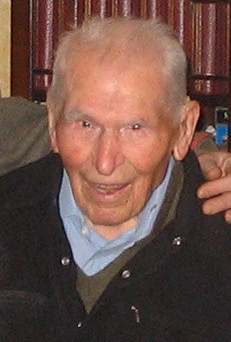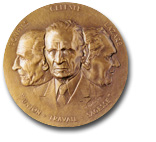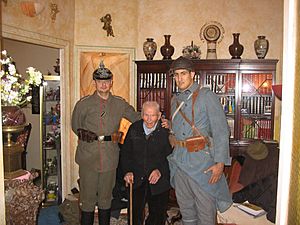Lazare Ponticelli facts for kids
Quick facts for kids
Lazare Ponticelli
|
|
|---|---|

Lazare Ponticelli in 2006
|
|
| Born | 24 December 1897 Bettola, Kingdom of Italy |
| Died | 12 March 2008 (aged 110 years, 79 days) Le Kremlin-Bicêtre, France |
| Allegiance | |
| Service/ |
French Army Italian Army French Resistance |
| Years of service | 1914–1920 |
| Battles/wars | World War I World War II |
| Awards | Croix de Guerre Médaille Interalliée Légion d'honneur Ordine di Vittorio Veneto |
| Other work | Piping and metal work |
Lazare Ponticelli (born Lazzaro Ponticelli; 24 December 1897 – 12 March 2008) was a very special person. He was 110 years old when he passed away. He was the last soldier from France who was officially recognized for fighting in World War I. He was also the last poilu (a French term for a foot soldier in WWI) from the trenches to die.
Lazare was born in Italy. When he was only eight, he traveled to France by himself. At 16, he lied about his age to join the French Army in 1914. Later, he was moved to the Italian Army. After the war, he and his brothers started a company called Ponticelli Frères. This company worked with pipes and metal. It even made supplies for World War II. The company was still running in 2021! Lazare also helped the French Resistance fight against the Nazis during WWII.
When he died, Lazare Ponticelli was the oldest man born in Italy and the oldest man living in France. Every year until 2007, he went to ceremonies on Armistice Day to honor soldiers who had died. In his later years, he spoke out against war. He even kept his WWI awards in a shoebox. The French government offered him a special state funeral. At first, he felt he didn't deserve it. But he eventually accepted, asking that the funeral remember all the common soldiers who died. French President Nicolas Sarkozy honored his wish. He dedicated a plaque to these soldiers at the funeral.
Contents
Lazare Ponticelli's Early Life
Lazare Ponticelli was born as Lazzaro Ponticelli. He was born in Cordani, a small village in Bettola, Italy. He grew up in a mountain village. He was one of seven children. His father sold animals and sometimes worked as a carpenter or shoemaker.
His mother farmed their small piece of land. Like many women in the area, she also traveled three times a year to the Po Valley. There, she worked in the rice fields. Even though the Ponticelli family worked very hard, they were poor. The children often went to bed hungry. When Lazare was two, his mother moved to France to find better work. After his father and oldest brother died, the rest of his family moved to Paris. Lazare stayed behind with neighbors.
At age six, Lazare started working. He made wooden shoes, called clogs. By 1906, when he was eight, he had saved enough money to buy a train ticket to Paris. He thought Paris was "paradise." To get to the train station, he walked about 34 kilometers (21 miles) to Piacenza. He couldn't speak French. But he found work as a chimney sweep in Nogent-sur-Marne. Later, he became a paper boy in Paris. He got a work permit when he was 13.
Serving in World War I
In August 1914, World War I began. Lazare was only 16 years old. He lied about his age to join the French Foreign Legion. He was assigned to the 4th Marching Regiment. He found his older brother, Céleste, in the same regiment. Lazare felt France had done a lot for him. He wanted to show his thanks by serving. He fought in places like Soissons and Douaumont, near Verdun. Lazare helped dig graves and trenches. He had promised Céleste to always help others. He even rescued a German soldier and a French soldier who were hurt.
Lazare was not a French citizen. In May 1915, Italy joined the war. He was then made to join the Italian Army. He wanted to stay with his French regiment. But he was taken to Turin by two police officers (gendarmes). He then joined the 3rd Alpini Regiment. Lazare fought against the Austro-Hungarian Army at Mount Piccolo, near the border of Austria and Italy.
He became a machine gunner. During an attack on an Austrian mountain position, a shell seriously wounded him. After resting in Naples, he went back to his post. He once said about his injury, "Blood was running into my eyes... I continued firing despite my wound."
One time, his regiment stopped fighting the Austrians for three weeks. The soldiers, who often spoke each other's language, traded bread for tobacco. They even took pictures together. In 1918, Lazare was attacked with poison gas. Hundreds of his fellow soldiers died. Thinking about war, he said, "You shoot at men who are fathers. War is completely stupid." In one of his last interviews, he was amazed that he had survived.
The Ponticelli Brothers Company
After the war, in 1920, Lazare started a metal work company. He started it with his brothers, Céleste and Bonfils. They called it "Ponticelli Frères," which means "Ponticelli Brothers." Their company was in Paris. It became very successful and well-known. In 1932, it became a private company. Its main work was with industrial chimneys.
During World War II, Lazare was too old to fight. He had become a French citizen in 1939. But he helped the war effort by providing his company's products to soldiers. When Germany took over northern France, he moved his factory to the "free zone" (unoccupied area). After the Germans took over all of France, he went back north. He started working with the French Resistance to fight against the Germans. After World War II, he added a piping department to his company.
He continued to manage the company until he retired in 1960. When he died, the company had 4,000 employees. In 2005, it made €300 million (about $320 million US dollars) in a year. The company now works in several countries outside France, like Angola.
Later Life and Legacy
Lazare Ponticelli lived with his daughter in a Paris suburb called Le Kremlin-Bicêtre until he died. Every year, until 2007, he went to Armistice Day ceremonies on November 11th. He was an honored citizen of his town. He even voted in the 2007 French presidential and legislative elections. On December 24, 2007, he officially became a supercentenarian. This means he was 110 years old or older. He celebrated his 110th birthday at the National History of Immigration Museum. He kept his war medals in a shoebox.
The French President at the time, Jacques Chirac, offered Lazare a state funeral. At first, Lazare said he didn't want one. But when the second-to-last recognized WWI soldier, Louis de Cazenave, died in January 2008, Lazare thought about it again. He eventually accepted a small ceremony. He asked for it to be "in the name of all those who died, men and women," during World War I.
Lazare Ponticelli died at his home in Le Kremlin-Bicêtre on March 12, 2008. He was 110 years old. When he died, he was the oldest man born in Italy and the oldest man living in France. Nicolas Sarkozy, the French president, announced that there would be a day of national remembrance for France's war dead. Lazare had at least one child, his daughter Janine Desbaucheron, who was 78 at the time.
His state funeral was held on March 17, 2008. The service was at Saint-Louis Cathedral in Les Invalides. Government ministers, soldiers, and Lazare's family attended. A French writer named Max Gallo gave a speech. A French student named Guillaume Kaleff read a poem written by his class in Lazare's honor.
Flags were flown at half-mast. President Sarkozy revealed a plaque dedicated to the veterans of World War I. Soldiers from the 3rd Foreign Infantry Regiment carried his coffin. This was the same type of regiment Lazare had fought in. After the ceremony, he was buried in his family's plot at Ivry Cemetery.
On November 11, 2008, the first Armistice Day after his death, a street in Le Kremlin-Bicêtre was renamed. It was called Rue de Verdun-Lazare-Ponticelli to honor him.
See also
 In Spanish: Lazare Ponticelli para niños
In Spanish: Lazare Ponticelli para niños
- List of last surviving World War I veterans by country
- Marching Regiment of the Foreign Legion
 | Valerie Thomas |
 | Frederick McKinley Jones |
 | George Edward Alcorn Jr. |
 | Thomas Mensah |



